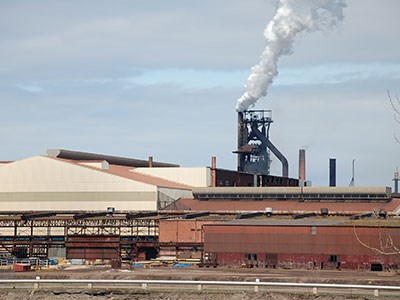Essar Steel Algoma announced in late July it secured US $100 million in short-term financing from its parent company, Essar Global Fund Ltd., as the money-losing Sault Ste. Marie steelmaker restructures to tackle a debt of more than $1 billion.
The company finalized the terms of an agreement which infuses cash into the operation from the Essar Global Fund with the first $25 million coming within five days. The money is needed to complete capital improvements to the operation and allows them to start stockpiling raw material used to make steel.
“This agreement provides for a comprehensive capital infusion, a substantial de-leveraging of our balance sheet and the refinancing of all of Algoma’s senior secured debt,” said Algoma CEO Kalyan Ghosh in a July 24 news release.
The agreement also provides Algoma with a total cash infusion from the fund of up to US $300 million as the company filed a restructuring plan under the Canadian Business Corporations Act and sought protection from American creditors under chapter 15 in the U.S.
The company maintains the restructuring won’t affect pension payments to retirees, employee wages or suppliers.
The privately held Mumbia, India-based conglomerate operates North American steel and mineral divisions.
Peter Warrian, a steel analyst and research follow at the University of Toronto, said Algoma has been under pressure for several months because of their debt obligations, pension payments and other pricing factors.
Warrian said Algoma needed cash to operate because of iron ore problems and ice conditions on the Great Lakes.
One of Algoma’s issues, he said, is that the company is locked into a long-term iron ore contract with Cliffs Natural Resources, even as iron ore prices kept diving.
“They’re stuck at $30 per ton, more than the market price,” which has caused a problem for the Sault plate and sheet steel producer, combined with an extended winter on the Great Lakes which caused a problem for the entire industry.
Warrian said the winter conditions that almost totally iced up the Great Lakes, and restricted the movement of iron ore, “drove steel mills and service centres nuts,” and has delayed construction projects on the back end.
“There’s been a delay on both the raw materials side and in shipping product around.”
What works in Algoma’s favour is an experienced and stable workforce, and its modern Direct Strip Production Complex that was built in the late 1990s.
“It just hums,” said Warrian, “but it’s the material costs going in. If they can’t get better raw material input, that’s a problem.”
The plant’s location in Northern Ontario, away from the southern Ontario and U.S. Midwest markets, where their competitors are, has always been a disadvantage.
Algoma’s location means a $15 per ton difference on steel pricing, he said.
“If you’ve got to overcome a $15 a ton locational disadvantage, taking a $30 hit on the iron ore, it means you’ve got a $45 disadvantage.”
Warrian said the entire steel industry needs steel pricing that is reasonable.
The auto industry has come back terrifically with 60 to 70 million cars in North America forecasted for next year, he said, but the construction sector is still down and major projects like Keystone are still stalled.
Warrian said there’s been a two-year pattern where North American steel prices have risen and fallen back.
“These steel companies as a whole, if you’re not running them at 81 to 83 per cent capacity, you can lose a lot of money in a hurry,” Warrian said.
“The whole industry has been running at 76 per cent for 24 months. Everybody’s under pressure.”
If that continues for another 24 months, Warrian suspects more companies will be restructuring and selling off assets at fire sale prices.




